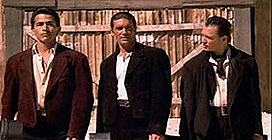|
|
|
|
Desperado
|
 |
|
Many people complain that Quentin Tarantino's film are nasty, amoral, boys-with-guns fantasies which reduce serious issues to comic book divertissements. But Tarantino is Ingmar Bergman compared to his confrère, Robert Rodriguez. Rodriguez has had one of those movie brat careers which journalists and publicists love to hype up. Desperado is essentially an elaborate second take on this director's no-budget debut El Mariachi (1992). It continues the premise which Rodriguez borrows (like many before him) from Sergio Leone's early spaghetti Westerns – a Man with No Name, ambiguously either anti-hero or divine saviour, who strolls into a lawless town on a revenge quest. This time the mariachi – carrying an arsenal of weapons inside his guitar – is incarnated by the charismatic Antonio Banderas. But those (like myself) who thrilled to the revelation of Banderas' new dimensions in the action extravaganza Assassins (1995) will be disappointed by his performance here. The Man with No Name has virtually no character either, and Banderas has been encouraged to add very few bits of business to the role. Plot is a purely secondary consideration in this odd, extreme film. From the word go, it is a movie of tall tales recounted and then lived out in sleazy, bloodstained bars. Quickly disintegrating into a series of often disconnected scenes, its single, overriding aesthetic aim seems to be the invention of the most outlandish, cartoonish action possible. As in Sam Raimi's spirited Western The Quick and the Dead (1995), characters light matches off each other's stubbly cheeks, and each new death by bullet, fire, explosion or broken neck is more exaggerated and absurd than the last. Indeed, Desperado gives renewed meaning to the hoary old term gratuitous violence. It would be a mistake, however, to take offence at Rodriguez's gleefully tasteless display of screen sadism. This is a film designed to prompt hysterical, incredulous giggles from its audience at every point, and on this level it succeeds perfectly. Everything – including the role for the sultry heroine Carolina (Salma Hayek) – is deliberately pitched at a silly, thoroughly cornball level. Probably the best moments of the film come when Rodriguez drops his ambition to contrive suspenseful, Tarantino-like clinches, and instead opts for a brand of wild, burlesque comedy that we have come to associate with the Coen brothers. The overt gags – such as when Banderas and an opponent keep picking up empty guns and misfiring at each other – are splendid. The comparisons of Rodriguez with Tarantino, Raimi and the Coens will come as easily to most reviewers as they do to me. Yet this family resemblance is perhaps finally rather deceptive. Desperado has less cinephile knowingness, less jazzy intricacy, and certainly less hipness than any film by these other directors. Instead, it is an authentically troubling piece of low culture. The emergence of Rodriguez's first mainstream feature in the midst of our hyper-cool, arthouse film culture is surely comparable to the disconcerting appearance, over thirty years ago, of Leone's first Western, A Fistful of Dollars (1964), hot on the heels of the French Nouvelle Vague. Although Leone's film was modelled closely on Akira Kurosawa, its tone was far rougher, more vulgar, sensational and – dare I say – plebeian. Leone's grand international success shoved a certain style of raw, Italian comedy in the face of cultured film buffs the world over, who had hitherto managed to remain sheltered from it. Now Rodriguez performs a similar gesture. Desperado is lovingly fashioned as a gross Mexican melodrama, in what I presume is a long, rich and popular national tradition. In the context of American cinema, it is far closer to the often-despised comedies of Cheech and Chong (the former has a plum role here) than the white-boy fantasies of Tarantino. Ultimately, Desperado is a strange mixture of virtuosity – particularly in the kinetic editing department, a job which Rodriguez handles himself – and crude, clunky artlessness. It is easy to decry Desperado for having wafer-thin characters and a wobbly storyline, and for churning out crazy set-pieces that eventually begin to wear a little thin. But this kinky fireworks display still provides invigorating, spectacular fun – not to mention a brutal head-kick to one's current arthouse preconceptions. MORE Rodriguez: Once Upon a Time in Mexico, Spy Kids, Spy Kids 3D, Sin City, From Dusk till Dawn, Four Rooms © Adrian Martin November 1995 |
![]()